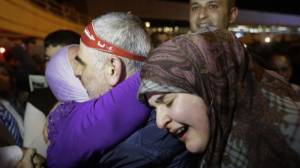
ISIS released 49 Turkish Hostages in Sept. 2014. (AP/Hussein Malla)
ISIS released 43 hostages on Monday. Kidnapping has been a major source of income for the terrorists, who collected millions of dollars for 230 Christians they abducted in Syria.
The Islamic State (ISIS) terror organization has collected millions of dollars in ransom for a group of Assyrian Christians it kidnapped in Syria a year ago, Christian officials and an opposition group said Monday, as the last 43 of 230 hostages were freed.
The release ended a year-long saga for the Christians — many of them women and children — during which families had no news from their loved ones.
Younan Talia of the Assyrian Democratic Organization told the Associated Press (AP) that about 40 remaining captives were released early Monday and arrived in the northeastern town of Tal Tamr. He said the release came after mediation led by a top Assyrian priest in northern Syria.
The terrorists captured the Assyrians, members of an ancient Christian sect, last February after overrunning several communities on the southern bank of the Khabur River in northeastern Hassakeh province.
The Assyrian Church of the East’s Diocese of Syria confirmed that this freed group comprises the final hostages among those abducted from Assyrian villages in February 2015, the London-based Acero aid agency said.

Mar Afram Athneil, Bishop of Syria and Chairman of Acero aid agency, with released hostages in January, when 16 were released. (Acero/Facebook)
Kidnapping for ransom is a main source of income for the terrorists, who have captured scores of journalists and aid workers in the past few years, releasing some for large sums of money and killing others. In November, ISIS said it killed a Norwegian and a Chinese captive after demanding ransom for their release two months earlier.
Talia said ISIS demanded a ransom of $18 million for the Assyrian Christians. He said the figure was later lowered following negotiations and that he did not know the final amount.
Osama Edward, director of the Stockholm-based Assyrian Human Rights Network, said 42 Christians, mostly young women and children, were released. The Britain-based Syrian Observatory for Human Rights also said 42 were released, including at least 17 women.
A Syrian Christian figure said the worldwide Assyrian community launched a campaign for the captives’ release shortly after they were abducted. He said a bank account was opened in the northern Iraqi city of Irbil and donations began to flow in from around the world.
“We paid large amounts of money, millions of dollars, but not $18 million,” said the man, who requested anonymity because he was not authorized to discuss the sensitive mediation. “We paid less than half the amount.”
The official added that the fate of five Assyrians who went missing during the abductions was still unknown.
A Shot in the Arm for ISIS
Observatory director Rami Abdurrahman said $25-30 million in ransom money was paid by businessmen and the Assyrian church, who asked that the terms of the deal remain secret to avoid allegations of supporting terrorism. Abdurrahman, whose group documents the war through activists on the ground, did not say how he got the information.
The money would be a shot in the arm for ISIS, which has been faced with a cash shortage in its so-called caliphate across parts of Syria and Iraq. AP reported earlier this month that the group was having a hard time meeting expenses, thanks to coalition airstrikes and other measures.
An Assyrian woman in Beirut whose parents, brother and sister-in-law were among those abducted and released over the past year, told AP that the detention left her parents “psychologically scarred.” She did not know how much was paid in the end, but heard that at some point the terrorists were demanding up to $50,000 for one person.
In November 2014, it was reported that ISIS had accumulated $35-45 million during the year in ransom money, according to Yotsna Lalji, a UN specialist on the issue. At around the same time, Forbes Israel ranked the Islamic State as the richest terror group in history, with $2 billion in annual revenues.
By: AP and United with Israel Staff










